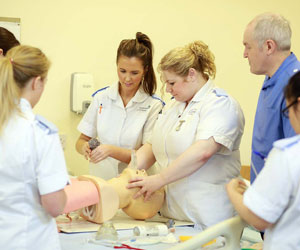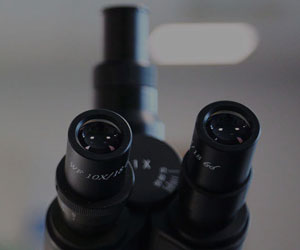Programme delivery update
We have adopted an online ‘blended’ learning approach to teaching on the ultrasound programme and our modules are taught in block release. Our suggestion is therefore that you are given this time by your placement to access the learning materials and tutorials on the scheduled module dates/times in a location that is best suited for you to learn, e.g. in a suitable quiet location at your placement site, or at home.
Most modules will have an element of live virtual tutorial type sessions using Blackboard Collaborate or Microsoft Teams, which you will be expected to engage with. You will need a suitable laptop or PC with speakers and a webcam and adequate internet access/broadband speed to work remotely on-line. Some modules may also have a campus based clinical skills element to the teaching.
The delivery of your modules may vary from tutor to tutor, module to module, so please always follow the guidance of your module leader and module Blackboard site. Please understand this approach to module delivery is new to us as well, so please try to be patient and understanding, we are doing our very best to ensure you remain supported throughout your learning.
For IT issues, further details on our IT services can be found here: https://www.cumbria.ac.uk/student-life/facilities/it-facilities/
There is also some further information related to on-line study here on our website which you may find helpful:
https://my.cumbria.ac.uk/Student-Life/Learning/Resources/Studying-from-home/Online-Learning/
This module will equip you with skills and knowledge you need for a successful career in breast ultrasound. Tuition is given by leading experts in the field. For those already in possession of a CASE accredited ultrasound qualification (PGCert or above) who wish to expand their scope of practice this module can be taken as a single module for continuing professional development.
This module covers the following:
Breast anatomy
- Breast and axillary anatomy
- Breast and axillary pathology (both benign and malignant)
Clinical requirement
- Clinical justification
- Breast symptoms and the correlation with pathology
- Communication skills
Breast Ultrasound Technique
- The basic ultrasound scanning technique for breast and axilla (lecture)
- Breast and axilla ultrasound scanning technique
Ultrasound Images
- Image interpretation
- Correlation of mammograms and breast ultrasound
- Reporting skills (how to construct the report, correct terminology, legal requirements)
- Correlation between mammography and ultrasound
Breast Biopsy
- FNA technique
- When to FNA
- Aseptic technique for performing FNA
Related application
- Elastography and its use in breast ultrasound
- Colour Doppler and power Doppler and its use in breast ultrasound
The module is part of the MSc Medical Imaging (Ultrasound) programme, which is accredited by CASE (Consortium for the Accreditation of Sonographic Education), allowing you to practice ultrasound in the UK and some overseas countries, on successful completion of the programme. The module itself is not CASE accredited as a stand-alone module.

Course study option
If you are not eligible to take this as a stand alone module, you may wish to explore the option of taking this as a PgC.
PgC Medical Imaging: Ultrasound
Graduate destinations
On successful completion of the course, you will be able to provide evidence of preparation for practice to the standards required for a first post-qualification sonographer role. We have consulted with local ultrasound service partners who have confirmed that this would allow employment of graduates in most regional NHS contexts.
However, applicants from a non-health care background should note that, at present, employment in some NHS Trusts would not be possible due to the requirement for professional registration. These potential restrictions on employment will be discussed with you during the application process and you will be asked to sign a memorandum of agreement confirming your understanding and acceptance.
Resources and facilities
We officially opened our high-tech ultrasound skills hub, one of the largest installations of its kind in the world, last year.
The skills hub is equipped with revolutionary ultrasound simulators which will enable students to gain basic skills by experiencing lifelike, hands-on training before entering the busy clinical environment of sonography.
With a UK-wide shortage of sonographers being identified by the government*, this half million-pound project was funded jointly by the university and a grant from Health Education North West.
The University of Cumbria has responded to the sonography workforce gap by expanding its portfolio of ultrasound courses to meet the needs of an increasingly pressured health care system. This advanced virtual-reality technology has facilitated the provision of a new accelerated route to a medical ultrasound postgraduate degree, aimed at students from non-clinical health and sciences backgrounds.
Emma Timperley (24), from Lancaster is one of this first cohort of full time postgraduate sonography students at the university. She says:
“My first degree was in biomedical sciences, but this postgraduate course will allow me to become a trained sonographer in two years. I had the opportunity to use this new technology for a few weeks before going out on my first placement and it’s been invaluable.
It not only gives you a real feel for the orientation of the ultrasound, but also provides all the basic information about anatomy that you need at this stage.”
Professional lead for medical sciences at the university, Charles Sloane, says:
“Students at the University of Cumbria are very fortunate to have access to this world-leading ultrasound skills development facility.”
“It will enable us to help address the shortage of sonographers that currently exists and ensure patients can continue to access the services they need to get a quick diagnosis of potentially life-threatening conditions, such as cancer.”
ScanTrainer, created by MedaPhor, is a specialist ultrasound skills training simulator made using ‘real feel’ technology which gives students a chance to learn what it feels like to carry out a real-life scan, preparing them for what they’ll experience in a clinical environment. In addition, its ‘virtual tutor’ technology means students are in control of their own learning, both in and out of class time.
Iain Dunbar, International Sales Manager at MedaPhor, comments:
“The new skills lab signals that the ultrasound education industry in the UK, and across the world, is finally responding to the demand for sonography skills as ultrasound grows in popularity as a diagnostic modality. The university’s approach is truly pioneering and we are delighted to be at the forefront alongside them.”
The new ‘Ultrasound Skills Hub’ at the university’s Lancaster campus was officially opened on 17 March 2016 by the then university vice chancellor Professor Peter Strike. An audience of invited guests from the healthcare professions was also given a demonstration of the new scanning equipment by postgraduate students.







